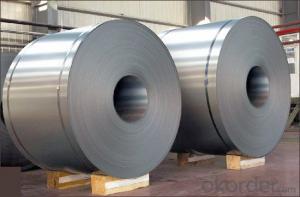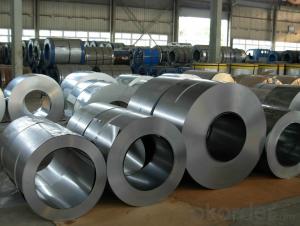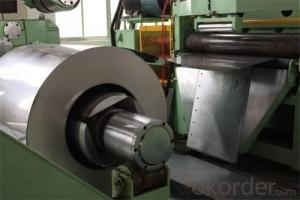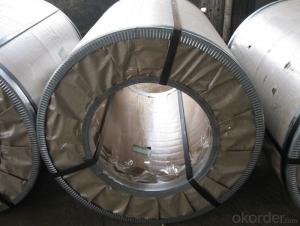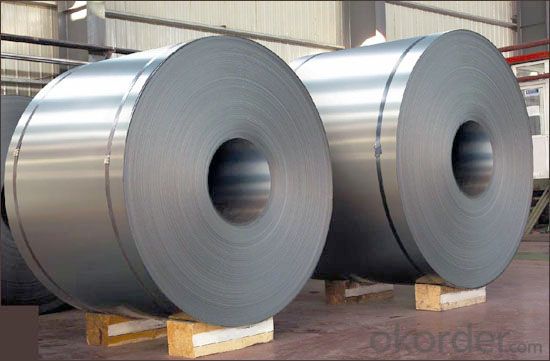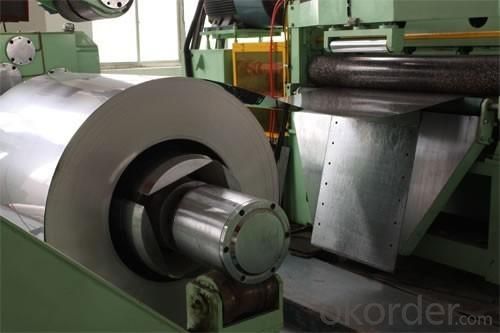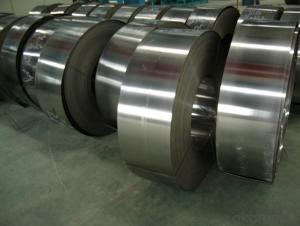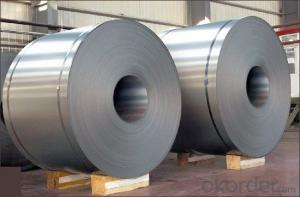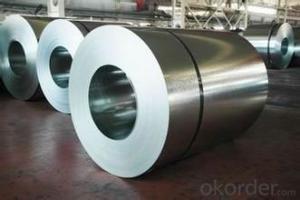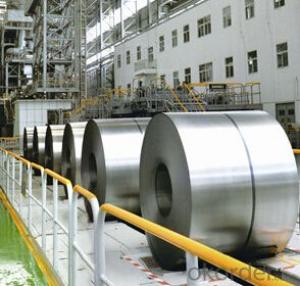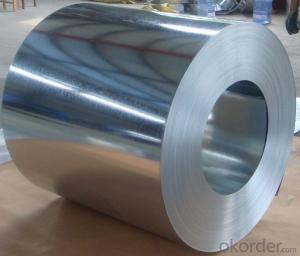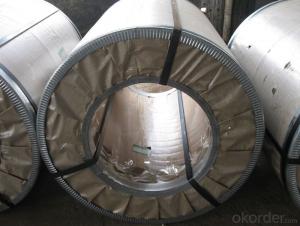Best Cold Rolled Steel Coil ASTM 1008 High Strength
- Loading Port:
- China main port
- Payment Terms:
- TT OR LC
- Min Order Qty:
- 50 m.t.
- Supply Capability:
- 10000 m.t./month
OKorder Service Pledge
OKorder Financial Service
You Might Also Like
Best Cold Rolled Steel Coil ASTM 1008 High Strength
1.Structure of Best Cold Rolled Steel Coil ASTM 1008 High Strength:
The raw material of cold rolled steel coil/sheet is high quality hot rolled product, and after pickling continuous rolling, degreasing, annealing,skin pass,slitting and cut to length line etc. Along with it many kinds of new technology and new process of global cold rolling production have been applied. Therefore the quality of the goods could be guaranteed.
2.Main Features Best Cold Rolled Steel Coil ASTM 1008 High Strength:
• Excellent process capability
• Smooth and flat surface
• Workability, durability
• Good visual effect
3. Cold Rolled Steel Images:
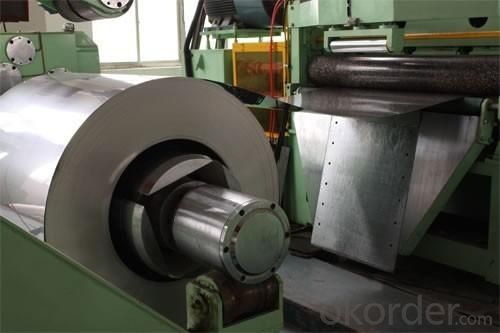
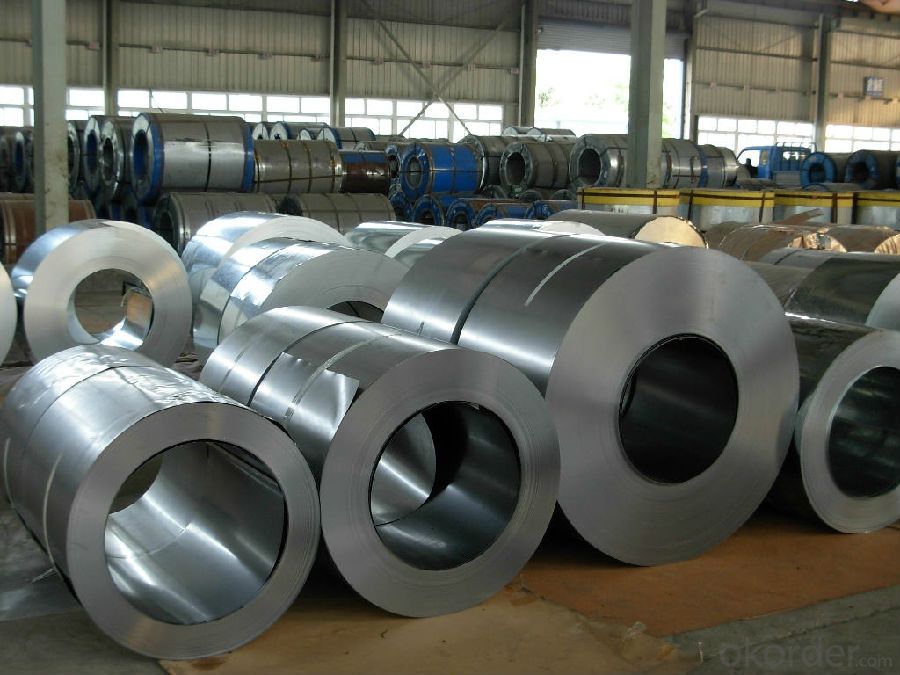
4.Cold Rolled Steel Specification
Standard:AISI,ASTM,DIN,GB,JIS,JIS G3302 ASTM 653M EN10142
Grade: Q195~Q345
Thickness: 0.16mm~2.0mm
Width: 1250mm MAX
Coil weight:3-12 MT
FAQ
1.How to guarantee the quality of the products?
We have established the international advanced quality management system,every link from raw material to final product we have strict quality test.
2. How long can we receive the product after purchase?
Usually within thirty working days after receiving buyer’s advance payment or LC. We will arrange the factory manufacturing as soon as possible. The cargo readiness usually takes 15-25 days, but the shipment will depend on the vessel situation.
- Q: How are steel coils used in the production of agricultural structures?
- Due to their exceptional strength and durability, steel coils find extensive use in the production of agricultural structures. These coils, typically composed of high-quality steel, have various applications within the agricultural industry. One major application of steel coils in agricultural structures involves the construction of buildings and storage facilities. By using steel coils, farmers can create robust frameworks that support the walls and roofs of these structures. The inherent strength of steel allows for the construction of spacious areas without the need for excessive support columns, providing farmers with ample storage space for their crops, machinery, and livestock. Furthermore, steel coils play a crucial role in the manufacturing of agricultural equipment and machinery. Whether it be tractors, plows, harvesters, or irrigation systems, steel coils are essential in the fabrication of these tools. The high tensile strength of steel ensures that these agricultural machines can endure the rigorous conditions of farming, including heavy loads, rough terrains, and exposure to harsh weather elements. Moreover, steel coils are also indispensable in the production of fencing and enclosures for agricultural purposes. Whether it's safeguarding crops from animals or establishing boundaries for livestock, steel coils are a vital component in constructing robust and reliable fences. The strength of steel guarantees that these fences can withstand the pressure from animals, preventing them from breaking through and causing harm to the crops or escaping. In conclusion, steel coils are a vital component in the production of agricultural structures and equipment. Their strength, durability, and versatility make them an ideal material for constructing buildings, manufacturing machinery, and creating fences in the agricultural industry.
- Q: which metals have a higher density than steel? and how does the density compare to steel( example: tungsten carbide is 2x [i think] more dense than steel.)
- Stainless steel 7480 -8000 kg/m^3 Brass 8100 -8250 Cobalt - 8746 Copper 8930 Gold 19320 Lead 11340 Mercury 13593 Molybdenum 10188 Nickel 8800 Platinum 21400 Plutonium 19800 Silver 10490 Tungsten 19600 Uranium 18900
- Q: How do steel coils withstand extreme temperatures?
- Steel coils are able to withstand extreme temperatures due to the unique properties of steel. Firstly, steel has a high melting point, allowing it to maintain its structural integrity even at extremely high temperatures. Additionally, steel has excellent thermal conductivity, which enables it to evenly distribute and dissipate heat. Furthermore, steel undergoes various heat treatment processes during manufacturing, such as quenching and tempering, which enhance its strength and resistance to temperature fluctuations. Overall, these factors make steel coils highly capable of withstanding extreme temperatures.
- Q: What are the common coil thicknesses available for steel coils?
- The available thicknesses for steel coils, which are commonly used in different industries and applications, can vary depending on specific requirements. The range of coil thicknesses for steel typically falls between 0.5mm and 3mm. In lightweight applications or situations where flexibility is necessary, thinner steel coils with thicknesses ranging from 0.5mm to 1.5mm are often preferred. These thinner coils find suitability in automotive body panels, roofing, and general sheet metal fabrication. On the other hand, for applications that demand higher strength and durability, thicker steel coils with thicknesses ranging from 1.5mm to 3mm are frequently employed. These thicker coils are commonly seen in heavy-duty construction, structural components, and industrial equipment manufacturing. It is important to keep in mind that these mentioned ranges are general and can be subject to variation depending on specific project requirements or customer preferences. Steel coil thicknesses can be tailored to meet specific needs, providing greater flexibility across various industries.
- Q: How are steel coils used in the production of steel locks?
- Steel coils are used in the production of steel locks as they provide the raw material required to create the lock components. The coils are processed and shaped into various lock parts such as the housing, shackle, and key mechanism, which are then assembled to form the final lock product.
- Q: And by how much? I'm pretty sure that sterling silver is stronger, but I'm wondering if I could still use a metal stamp to stamp into something that's stainless steel - if it would be soft enough?
- Silver is a relatively soft metal, while stainless steel is an alloy that has been designed for strength and durability. Your ability to use the stamp on steel will largely depend on the stamp's material. Why not just man up and give it a go?
- Q: How are steel coils processed before being used in manufacturing?
- Steel coils undergo several processing steps before they are used in manufacturing. These steps typically include cleaning, pickling, cold rolling, annealing, and coating. Cleaning involves removing any dirt or impurities from the surface of the coil. Pickling is a chemical process that removes scale and oxides from the steel, enhancing its surface quality. Cold rolling reduces the thickness and improves the hardness of the steel. Annealing involves heating the coil and then slowly cooling it to enhance its ductility and reduce internal stresses. Lastly, coating is applied to protect the steel from corrosion or to enhance its appearance.
- Q: What is the difference between hot-rolled and cold-rolled steel coils?
- The main difference between hot-rolled and cold-rolled steel coils lies in the production process. Hot-rolled steel coils are made by heating the steel above its recrystallization temperature, causing it to become malleable and allowing it to be rolled into the desired shape. This process results in a thicker and less precise product with a rough surface. On the other hand, cold-rolled steel coils are made by cooling the hot-rolled steel and then passing it through rollers at room temperature. This process enhances the steel's strength, durability, and dimensional accuracy, resulting in a thinner and smoother product that is ideal for applications requiring precision.
- Q: Are they made using the same processes, or is tempered steel made without the quenching process?
- No. Not quite. The term 'Hardened steel' is often used to refer to 'Heat treated steel'. There are two separate steps in heat treatment. First the red hot steel is 'quenched' (rapidly cooled). This yields maximum hardness ,but the steel may be too brittle for the intended purpose. The next stage, 'tempering' is heating to a limited temperature, and slow cooling. This reduces the hardness somewhat, depending on the re-heat temperature, but restores some of the toughness lost in the first stage.
- Q: Can steel coils be used in the production of furniture?
- Furniture production can incorporate steel coils, which offer strength, durability, and stability. This raw material is commonly utilized in manufacturing different types of furniture like chairs, tables, and bed frames. Steel coils enable heavy-duty usage by providing the necessary resilience. Furthermore, their adaptability allows for various designs and sizes, granting versatility in furniture production. Transforming the coils into components such as frames or support structures establishes a solid foundation. Additionally, the use of steel coils in furniture production enhances aesthetics as they can be finished in diverse colors and coatings to match the desired style. Overall, steel coils are a prevalent and pragmatic choice for furniture manufacturers due to their strength, durability, and design potential.
Send your message to us
Best Cold Rolled Steel Coil ASTM 1008 High Strength
- Loading Port:
- China main port
- Payment Terms:
- TT OR LC
- Min Order Qty:
- 50 m.t.
- Supply Capability:
- 10000 m.t./month
OKorder Service Pledge
OKorder Financial Service
Similar products
Hot products
Hot Searches
Related keywords
